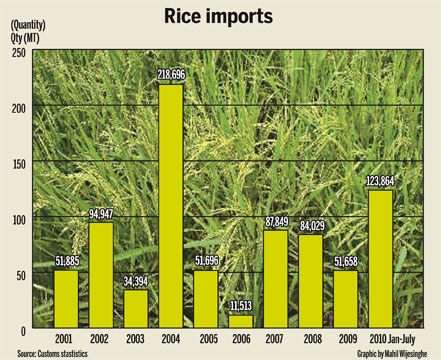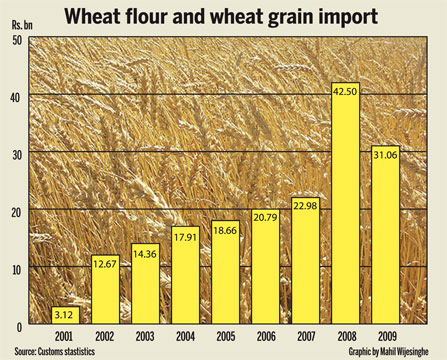|
Campaign for rice:
Wheat flour cannot be totally substituted
by Gamini WARUSHAMANA
Wheat flour still dominates and holds its position as the second
major staple food of the people in the country despite campaigns that
challenge its nutritional value, health issues as well as continuous
price increase.
 According to import statistics there is no significant decline in
wheat flour and wheat grain imports over the last ten years. According to import statistics there is no significant decline in
wheat flour and wheat grain imports over the last ten years.
There is a fluctuation in wheat imports mainly due to the
substitution effect of rice price increase or decline. Wheat imports
increase when there is an increase in rice price and vice versa.
Accordingly, our national campaign for promotion of rice as a
substitute for wheat flour has not proved a great success.
There are several factors for this failure. Firstly nobody should
expect a magical change in food habits of the people. Most of the
projections during the last few years in this campaign are mere wishes
and not realistic.
It was driven by the new nationalistic thinking in the political
arena with some visionaries wishing for a self sufficient Sri Lanka
where everyone eats rice and curry all three meals of the day. They
forget the fact that people usually get addicted to the taste or other
specific qualities of food and beverages and it is difficult to change
over night.
The price difference between two food items is also a factor and
today this is the only factor that shows a significant impact on demand
for wheat flour or wheat flour based food items.
According to the Bakery Owners Association, as the price of kg of
rice has dropped to Rs.40-50, there is a decline in demand for bread.
This happens all the time when the price of rice declines. One reason
for this shift is that poor people who consumed bread, an inferior food
in Sri Lankan culture compared to rice, as they were unable to afford
rice, have shifted to consuming rice. However, this trend will not
remain forever even it the price of rice remains low over a long period.
Because people also consider convenience and they adjust to new
prices over time and return to consume bread. On the other hand the
impact on other bakery products made of wheat flour do not change with
the change in the price of rice.
The campaign to promote rice instead of wheat had scientific backing
and research was carried out. New technology produced food items similar
to wheat based food products. However, inherent qualities of two
substances cannot be overcome and there were issues. For instance the
quality of rice based bread cannot meet the quality of bread produced by
wheat and will not be of the quality that our consumers are used to.
Again, the price factor was also not favourable.
The price of rice flour is always higher than the price of wheat
flour, unless government imposes higher taxes on wheat.
Another factor is that the quantity of rice produced by the country
is not sufficient to keep rice, rice flour and rice based products
competitive in the market.
On several occasions we broke the records of King Parakramabahu and
declared that we are self-sufficient in rice, but the truth is not so.
We still import rice.
For instance today the price of rice has dropped not because we have
produced enough. During the first seven months of the year we have
imported 123,864 tonnes of rice worth Rs.6.6 billion. Due to this
imported rice supply together with the bumper Maha season harvest, today
we have an excess supply and therefore a lower price.
This situation will not remain forever and will change with weather
conditions and other factors.
On the other hand, although we wish to substitute wheat flour with
rice flour, the rice flour industry has not been developed to meet the
quantity or quality of rice flour the bakery industry needs at least to
try and adjust in making food items.
 Similarly the main wheat flour consumers, the poorest people in the
estate sector will continue to consume wheat flour based rotti because
it is linked to their income, daily routin of work, cost of cooking and
other factors. Similarly the main wheat flour consumers, the poorest people in the
estate sector will continue to consume wheat flour based rotti because
it is linked to their income, daily routin of work, cost of cooking and
other factors.
Inconsistency in policies will also damage this campaign.
A sharp drop in the price of paddy will definitely discourage farmers
and paddy production may be affected in the coming seasons.
The dilemma in decision making over interest of the farmers against
the interest of the consumers is still prevailing and policies change
time to time. For instance, a huge stock of rice has been imported this
year considering consumers' interest during the election period.
Rice flour has almost shifted wheat flour in making string hoppers at
household level as well as domestic industry level and this can be
considered as an area of success in this campaign. This has been
successful because factors such as convenience, affordability and
availability of rice flour for string hoppers are being fulfilled.
Wheat consumption can be reduced to a certain extent if these issues
are considered and addressed. But we will never be able to totally
substitute wheat consumption by the consumption of rice.
|

